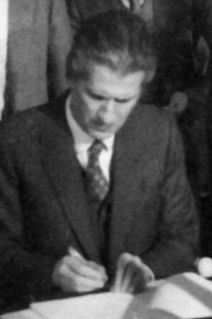The History of Algeria from 1962 to 1999 includes the period starting with preparations for independence and the aftermath of the independence war with France in the 1960s to the Civil War and the 1999 presidential election.
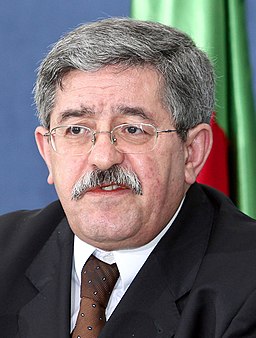
Ahmed Ouyahia is an Algerian politician who has been Prime Minister of Algeria since 2017; previously he was Prime Minister from 1995 to 1998, from 2003 to 2006, and from 2008 to 2012. A career diplomat, he also served as Minister of Justice, and he was one of the founders of the National Rally for Democracy (RND) as well as the party's secretary-general. He is considered by Western observers to be close to the military of Algeria and a member of the "eradicator" faction in the 1990s civil war against Islamist militants.

The Democratic National Rally is a political party in Algeria. It is led by the Prime Minister Ahmed Ouyahia. The party held its Second Congress on 15–17 May 2003.

The Movement for the Society of Peace is an Islamist party in Algeria, led until his 2003 death by Mahfoud Nahnah. Its current leader is Bouguerra Soltani. It is aligned with the international Muslim Brotherhood.

Ali Benflis is an Algerian politician who was Head of Government of Algeria from 2000 to 2003. In 2003, he became the general secretary of the National Liberation Front party. Benflis was a candidate in the 2004 presidential election, but the poll resulted in the re-election of Abdelaziz Bouteflika. Benflis ran yet again as an independent candidate in the 2014 Algerian presidential elections held on 17 April 2014. As a result, Abdelaziz Bouteflika was reelected as president with 81.53% of the votes, with Benflis ending as runner-up with 12.18%.

Liamine Zéroual is an Algerian politician who was the fourth President of Algeria from 31 January 1994 to 27 April 1999.

Chadli Bendjedid was the third President of Algeria; his presidential term of office ran from 9 February 1979 to 11 January 1992.
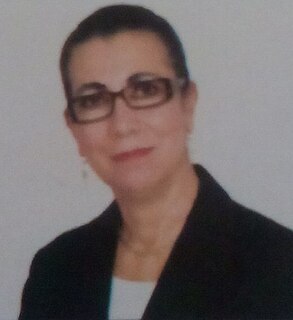
Louisa Hanoune is the head of Algeria's Workers' Party. In 2004, she became the first woman to run for President of Algeria. Hanoune was imprisoned by the government several times prior to the legalization of political parties in 1988. She was jailed soon after she joined the Trotskyist Social Workers Organisation, an illegal party, in 1981 and again after the 1988 October Riots, which brought about the end of the National Liberation Front's (FLN) single-party rule. During Algeria's civil war of the 1990s, Hanoune was one of the few opposition voices in parliament, and, despite her party's laicist values, a strong opponent of the government's "eradication" policy toward Islamists. In January 1995, she signed the Sant'Egidio Platform together with representatives of other opposition parties, notably the Islamic Salvation Front, the radical Islamist party whose dissolution by military decree brought about the start of the civil war.
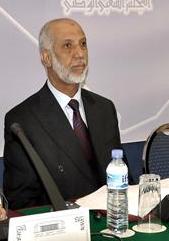
Abdelaziz Belkhadem is an Algerian politician who was Prime Minister of Algeria from 2006 to 2008. He was also Secretary-General of the National Liberation Front (FLN). Belkhadem served as Minister of Foreign Affairs from 2000 to 2005 and Personal Representative of President Abdelaziz Bouteflika from 2005 to 2006; after serving as Prime Minister from 2006 to 2008, he was again appointed as Personal Representative of the Head of State in 2008.

The 2002 Algerian Legislative election was held in Algeria on 30 May 2002 to elect members of the People's National Assembly. The governing National Liberation Front (FLN) won a majority of seats in the election. The election suffered from a low turnout, violence and boycotts by some opposition parties.
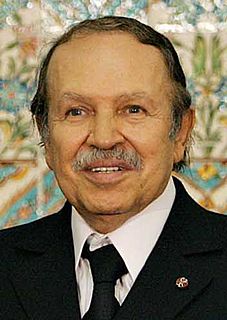
A presidential election was held in Algeria on 9 April 2009.
Events from the year 2007 in Algeria.

A legislative election was held in Algeria on 10 May 2012. The incumbent coalition, consisting of the FLN of President Abdelaziz Bouteflika and the RND of Prime Minister Ahmed Ouyahia, held on to power after winning a majority of seats. The Islamist parties of the Green Algeria Alliance lost seats.

Abdelmalek Sellal is an Algerian politician who was Prime Minister of Algeria from 3 September 2012 to 13 March 2014 and again from April 2014 to May 2017.

Presidential elections were held in Algeria on 17 April 2014. Incumbent President Abdelaziz Bouteflika was re-elected with 82% of the vote. Issues in the campaign included a desire for domestic stability after the bloody civil war of the 1990s, the state of the economy, the frail health of the 15 year incumbent and 77-year-old president whose speech was "slurred and inaudible" in his only public outing during the campaign, and the less-than-wholehearted support given the president by normally united and discrete ruling class.

Presidential elections are scheduled to be held in Algeria on 18 April 2019.







